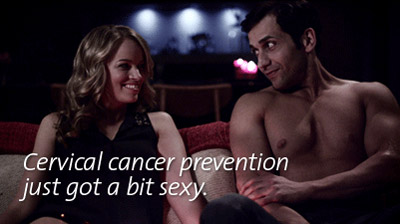Cancer Council Victoria Unveils Raunchy New Campaign

Cancer Council Victoria Unveils Raunchy New Campaign
Cancer Council Victoria (CCV) is turning up the heat in the battle against cervical cancer, with the launch of a racy new campaign reminding women of the link between cervical cancer and sex.
The campaign revolves around a short video depicting an intimate scene between a couple that is dramatically interrupted by the woman's flashing 'anti-cervical cancer underwear'. The film is aptly titled 'It doesn't have to be like this'.
The risqué concept is a new approach for the Cancer Council, which is hoping the enticing combination of sex and humour will help cut through common misconceptions about cervical screening and motivate more women to take part.
'Many women, particularly those in their 30s, still aren't getting the message that if they have ever had sex, even safe sex, they are at risk of developing cervical cancer,' said Hiranthi Perera, Program Manager of PapScreen Victoria, the cervical screening program housed within CCV.
'Cervical cancer is caused by the human papillomavirus (HPV) which is an extremely common sexually transmitted infection. It's usually harmless, but persistent HPV infections can cause cervical cell changes which if left undetected and untreated, can lead to cervical cancer.
'This is why it's so important for all women who have ever been sexually active to have a Pap test every two years, even if they've had the HPV vaccine and even if they've had the same partner for a long time. Having regular Pap tests is the only way to detect these changes,' she said.
In Victoria, around 60 per cent of eligible women are participating in cervical screening every two years as recommended.
'Up to 90 per cent of cervical cancer cases are preventable with two-yearly Pap tests yet over a third of women still aren't screening regularly, particularly young women in their 20s and 30s' said Ms Perera.
'We're hoping women will see this video and feel compelled to send it to their friends and sisters. We don't mind if it's for a laugh, just as long as they're taking in the message and book a Pap test when they're due.'
Pap tests are provided in Australia via the National Cervical Screening Program to women aged 18-70. Since the program was introduced in 1991, the number of deaths caused by cervical cancer has halved.
To find out more about PapScreen Victoria's latest campaign, or for general information on cervical cancer, HPV and Pap tests, visit www.papscreen.org.au or call the Cancer Council Helpline on 13 11 20.
MORE
- Chiropractic Myths & Truths
- Gerard Fogarty Arthritis and Knee Replacement...
- Kym Ellery The ELLERY Eyewear Collection Interview
- Dr Ross Walker The Real Modern Killers Interview
- Shelly Horton Hay Fever Help Interview
- Sebastian VanVeenendaal Royal Rehab's Beach...
- Abigail Koch Family Private Health Insurance...
- Monique Cashion Organic Awareness Month Interview
- Dr Bill Harris Omega-3s Interview
- The Top Ten Health Myths Busted
- Professor Bolin IBD Management a Life-Long...
- Anthia Koullouros Best Cold and Flu Defence...
- Leprosy in NSW
- Julie-Anne Mitchell Go Red for Women Healthy...
- Insight into Chronic Disease Hospitalisations...
- Jeff Chan Mobile Phone Allergies Interview
- How to Conquer Bad Winter Health Habits
- Bad Cholesterol Behind Cancer Spreading In Body
- New Screening Test Recommended To Help Prevent...
- Support For The Rural Nurse Workforce A...
- Kathy Nielsen Ovarian Cancer Australia National...



